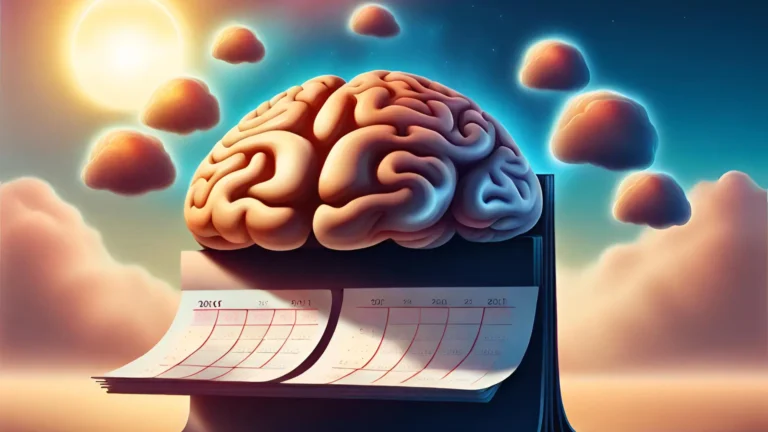Attention-Deficit/Hyperactivity Disorder (ADHD) presents unique challenges in time management and organization. Suppose you suffer from ADHD and time management. In that case, this article is for you – it delves into the nuances of ADHD and how tailored calendar use can significantly improve time management for individuals with this condition. We’ll explore strategies that cater to the specific needs of those with ADHD, ensuring that calendars are more than just a scheduling tool but a cornerstone of a balanced, organized life. Let’s start with the basis!
What Is ADHD?
Attention-Deficit/Hyperactivity Disorder (ADHD) is a neurodevelopmental disorder characterized by symptoms such as inattention, hyperactivity, and impulsivity. These symptoms can significantly impact an individual’s ability to manage time effectively. People with ADHD often struggle with:
- Procrastination: Difficulty in starting tasks, often leading to last-minute rushes.
- Time Blindness: Challenges in estimating how long tasks will take and perceiving the passage of time accurately.
- Distraction: Susceptibility to external and internal distractions makes staying focused on tasks hard.
- Prioritization Issues: Difficulty prioritizing tasks can lead to focusing on less important activities.
- Executive Function Difficulties: Impairments in executive function, a set of cognitive processes used for planning, organizing, and completing tasks.
These challenges can lead to missed deadlines, underestimating the time needed for tasks, and feeling overwhelmed overall. Effective time management strategies, including the use of calendars, are crucial for individuals with ADHD to navigate their daily lives more successfully.
How Does Calendaring Help People With ADHD?
Calendaring is a particularly effective tool for people with ADHD due to several key benefits:
- Structure and Routine: Individuals with ADHD often struggle with maintaining a consistent routine. Calendars provide a visual and tangible structure for organizing their days, weeks, and months. This helps in establishing a routine, which can be particularly grounding for those with ADHD.
- Time Management and Planning: ADHD can impair one’s ability to gauge the passage of time accurately, a phenomenon known as ‘time blindness’. Calendars help in breaking down this barrier by allowing individuals to visually map out their time, making it easier to plan and allocate time for various tasks.
- Reducing Overwhelm: People with ADHD often feel overwhelmed by tasks and responsibilities. Calendars help in organizing these tasks in a manageable way, reducing the anxiety and stress associated with a heavy workload.
- Improving Focus and Productivity: By laying out tasks and commitments, calendars can help individuals with ADHD to focus on one task at a time, improving overall productivity. It also helps in minimizing distractions, as the person knows what they need to be focusing on at any given time.
- Enhancing Memory and Accountability: ADHD can affect memory, leading to forgotten appointments or deadlines. Calendars serve as a reminder tool, not only prompting individuals about upcoming tasks but also helping them to hold themselves accountable for their commitments.
- Goal Setting and Tracking Progress: Calendars enable individuals with ADHD to set short-term and long-term goals, and track their progress towards achieving them. This can be highly motivating and provide a sense of accomplishment.
- Customization to Individual Needs: Calendars can be tailored to suit personal preferences and needs, whether it’s a digital calendar with alerts and reminders or a physical planner with color-coded sections. This customization ensures that the tool is as effective as possible for the individual using it.
In summary, calendars are a vital tool for people with ADHD, aiding in managing time, reducing stress, improving focus and productivity, and helping in the overall organization of their daily lives. Now that we’re aware of the key benefits of calendaring let’s take a look at the overall role of calendaring among people with ADHD.
The Role Of Calendaring
The role of calendaring in managing ADHD is multifaceted and crucial, addressing several key areas that are often challenging for individuals with ADHD. Below is why an individual with ADHD may benefit from calendaring.
- Providing Structure and Consistency: Calendars offer a visual and tangible framework for organizing time. This structure is particularly beneficial for people with ADHD, who may struggle with maintaining consistent routines. Regularly using a calendar can instill a sense of order and predictability, which can be comforting and stabilizing.
- Mitigating Time Blindness: Many individuals with ADHD experience ‘time blindness’, a difficulty in perceiving and estimating time. Calendars help by making time more tangible, and breaking it down into visible segments. This visual representation of time aids in better planning and estimating tasks and appointments.
- Aiding in Task Management and Prioritization: Calendaring allows for detailed scheduling of tasks, helping individuals with ADHD to break down larger projects into smaller, more manageable steps. It also aids in prioritizing tasks, ensuring that important deadlines are not overlooked and that tasks are approached in a logical sequence.
- Reducing Overwhelming and Anxiety: By clearly laying out tasks and appointments, calendars can help reduce the feeling of being overwhelmed—a common issue for those with ADHD. Knowing what needs to be done and when it needs to be done helps to alleviate anxiety associated with a crowded to-do list.
- Enhancing Focus and Reducing Procrastination: With tasks and deadlines clearly marked, individuals with ADHD can better focus on the task at hand. Calendars also help in setting specific time blocks for tasks, which can minimize the tendency to procrastinate.
- Facilitating Memory and Reminders: Memory challenges are common in ADHD. Calendars act as an external memory aid, reminding individuals of upcoming commitments and deadlines. The use of digital calendars with alert functions can be particularly helpful in this regard.
- Encouraging Self-Reflection and Adjustment: Regular use of a calendar encourages individuals to review their schedules, reflect on their time management, and make necessary adjustments. This self-reflection is crucial in developing more effective time management strategies over time.
- Supporting Long-Term Planning and Goal Setting: Calendars are useful for more than just daily and weekly planning; they also aid in long-term planning and goal formulation. Individuals with ADHD can better prepare and work toward their objectives by picturing future events and goals.
In essence, calendaring serves as a vital tool in managing the unique challenges of ADHD, enabling individuals to better navigate their daily lives, meet their obligations, and work towards their personal and professional goals.
With all these benefits of calendaring, it’s no wonder that you’d want one too. There’s no need to worry, though, as we already have the best calendaring tool for you, Akiflow. The tool is much more than a calendar.
Calendaring With Akiflow
Using Akiflow for calendaring can be particularly beneficial for individuals with ADHD due to its comprehensive features and integration capabilities. Akiflow is a task and calendar management tool designed to streamline and optimize time management. Here’s how it can be advantageous:
- Centralized Task Management: Akiflow allows users to consolidate tasks from various platforms into one centralized location. This integration is especially helpful for people with ADHD, as it reduces the confusion and overwhelm of managing multiple apps or platforms.
- Efficient Scheduling: Akiflow offers efficient scheduling features, including the ability to add and organize tasks and events quickly. The tool’s intuitive interface helps in easily scheduling and rescheduling tasks, which is crucial for individuals who may struggle with planning and time estimation.
- Time Blocking: The time-blocking feature in Akiflow is particularly useful for ADHD management. It allows users to allocate specific time slots for tasks, aiding in focus and reducing the likelihood of procrastination.
- Reminders and Notifications: Akiflow’s reminder system can be a significant aid for those with ADHD, who often struggle with forgetfulness and time awareness. The reminders ensure that important tasks and appointments are not missed.
- Customization and Flexibility: The tool offers a high degree of customization, which is beneficial for tailoring it to individual needs and preferences—a key aspect for those with ADHD who might require a personalized approach to task management.
- Integration with Other Apps: Akiflow integrates with various other applications like Slack, Asana, Trello, and more. This feature ensures that all tasks and information are synced, reducing the hassle of switching between different apps and platforms.
- Focus Mode: The focus mode in Akiflow helps users concentrate on one task at a time, which is particularly important for ADHD individuals who may be prone to distractions.
In summary, Akiflow offers a range of features that align well with the needs of individuals with ADHD, supporting them in organizing their tasks, managing their time more effectively, and ultimately enhancing their productivity and reducing stress.
Is Calendaring Helpful?
Yes. According to CHADD (Children and Adults with Attention-Deficit/Hyperactivity Disorder), a leading resource on ADHD, calendaring can be beneficial for people with ADHD. According to CHADD, many individuals with ADHD face challenges with organizational skills, poor time management, and issues with working memory, leading to lost time and incomplete projects. A day planner or calendar can be an important tool for managing time, remembering responsibilities, staying organized, and lessening the impact of ADHD on work and home lives.
Utilizing A Calendar The Correct Way
There are thousands of calendaring applications out there, but only a handful of them are considered to be decent. Even among them, Akifow comes out at the top due to its simplicity and its multiple interactions with other applications. Let’s now take a look at some tips and tricks for using a calendar application as an ADHD individual.
- Simplify Your Calendar System: Choose a calendar system that is simple and easy to use. Overcomplicated systems can be overwhelming. Whether it’s a digital or physical calendar, it should be intuitive and not require too much time to manage. Applications like Akiflow are easy-to-use and brimming with features.
- Consistent Daily Review: Incorporate a daily review of your calendar as part of your routine. This helps in staying on top of tasks and appointments and makes adjustments as needed. It’s also a good time to set priorities for the day.
- Weekly Planning Sessions: Set aside time each week to review and plan for the upcoming week. This broader overview can help you prepare for larger tasks or events and ensure that you allocate enough time for them. You can use the Rituals feature of Akiflow as well.
- Use Time Blocking: Assign specific blocks of time for different activities or tasks. This helps in managing time more effectively and ensures that you dedicate focused time to each task, reducing the chances of procrastination.
- Color Coding: Use color coding to differentiate between types of tasks, appointments, or priorities. This visual aid can make it easier to quickly understand your schedule at a glance.
- Set Reminders and Alarms: For those who struggle with forgetfulness or time blindness, setting reminders and alarms can be a lifesaver. These can help you remember important tasks and deadlines.
- Incorporate Buffer Time: Always include buffer time between tasks to account for transitions and unexpected delays. This is especially important for ADHD individuals, as transitioning from one task to another can sometimes be challenging.
- Prioritize and Limit Tasks: Avoid overloading your calendar. Prioritize tasks and limit the number of commitments you take on each day to prevent feeling overwhelmed.
- Review and Adjust Regularly: Regularly review your calendar to see what’s working and what isn’t. Be flexible and willing to adjust your strategies as needed. What works one week might not work the next, and that’s okay.
- Use the Calendar as a Decision-Making Tool: Before taking on new commitments, consult your calendar. This can help in making informed decisions about whether you have the time and energy to commit to new tasks or events.
- Delegate and Share Calendars: If possible, delegate tasks that are less critical or share your calendar with family members or colleagues to coordinate schedules better.
Conclusion
In conclusion, effectively managing time with ADHD presents unique challenges, but with the right tools and strategies, it can be significantly improved. The comprehensive guide to calendar use outlined in this article provides practical and adaptable techniques tailored to the needs of individuals with ADHD. By choosing a suitable calendar system, incorporating daily and weekly planning sessions, utilizing time blocking and reminders, and regularly reviewing and adjusting strategies, those with ADHD can enhance their ability to manage time, reduce overwhelm, and increase productivity.

Navigating Interruption Anxiety with ADHD
Discover key strategies for managing interruption anxiety in a digital world, focusing on structured environments, time management, and mindfulness to enhance productivity and well-being.

ADHD Body Doubling: A Unique way to improve productivity
Discover ADHD Body Doubling: a distinctive productivity technique rooted in the power of human presence. Unveil its significance, especially for those with ADHD, and learn how it can reshape focus and task completion.

How To Hyperfocus With ADHD
Unlock the potential of Hyperfocus in ADHD to boost productivity while avoiding burnout. Explore the connection between ADHD and hyperfocusing, learn to recognise triggers, and harness this ability for personal and professional growth with the aid of tools like Akiflow.

